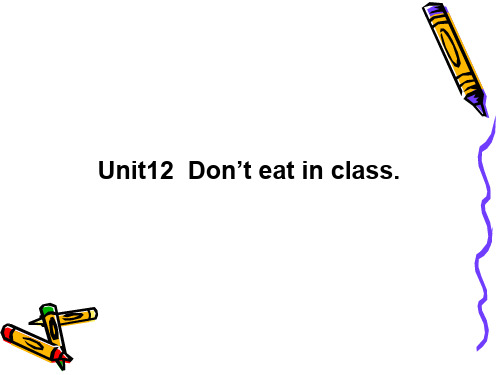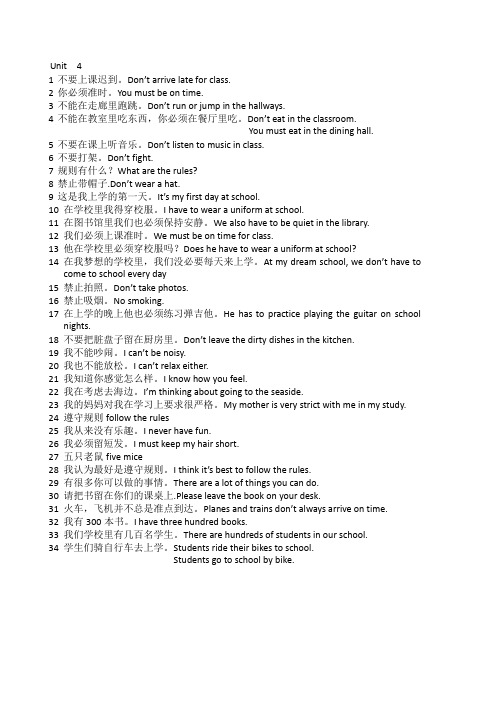2016七年级英语下册口译教学Unit 4 Don’t eat in class.Section A
- 格式:pptx
- 大小:193.14 KB
- 文档页数:30

Unit 4 Don't eat in class 教材听力原文及译文Section A1b Listen. What rules are these students breaking? Write the numbers after the names. Ms. Clark: Hey, Peter. You know the rules. Don ’trun in the hallways.Peter: Sorry, Ms. Clark.Mr. Smith: Amy, don ’t eat in the classroom. You must eat in the dining hall.my: Oh, sorry, Mr. Smith.Mr. Smith: Hey, Mike, don’t listen to music in class.Mike!Boy: He can ’t hear you, Mr. Smith . 2a Listen. Check (√) the activities Alan and Cindy talk about.Cindy: What are the school rules, Alan? Alan: Well, we can ’t listen to music in the classroom or hallways. But we can listen to it outside or in the music room.Cindy: Uh-huh.Alan: And we can’t eat in the classroom, but we caneat in the dining hall.Cindy: Oh. And can we wear a hat in class?Alan: No, we can’t. What else? Oh, you can ’t fightwith your classmates. That makes the teachers really unhappy. Cindy: I see…2b Listen again. Can Alan and Cindy do these activities? Circle can or can’t above. Cindy: What are the school rules, Alan?听录音。


1不要上课迟到。
Don’t arrive late for class.2你必须准时。
You must be on time.3不能在走廊里跑跳。
Don’t run or jump in the hallways.4不能在教室里吃东西,你必须在餐厅里吃。
Don’t eat in the classroom.You must eat in the dining hall.5不要在课上听音乐。
Don’t listen to music in class.6不要打架。
Don’t fight.7规则有什么?What are the rules?8禁止带帽子.Don’t wear a hat.9这是我上学的第一天。
It’s my first day at school.10在学校里我得穿校服。
I have to wear a uniform at school.11在图书馆里我们也必须保持安静。
We also have to be quiet in the library.12我们必须上课准时。
We must be on time for class.13他在学校里必须穿校服吗?Does he have to wear a uniform at school?14在我梦想的学校里,我们没必要每天来上学。
At my dream school, we don’t have to come to school every day15禁止拍照。
Don’t take photos.16禁止吸烟。
No smoking.17在上学的晚上他也必须练习弹吉他。
He has to practice playing the guitar on school nights.18不要把脏盘子留在厨房里。
Don’t leave the dirty dishes in the kitchen.19我不能吵闹。
I can’t be noisy.20我也不能放松。

七年级下册英语Unit4Donteatinclass教案Unit 4 Don’t eat in class.Section A (1a-2d)⼀、教学⽬标:1. 语⾔知识⽬标:1) 能掌握以下单词:rules, arrive, late, hall, dinning hall, listen, listen to, fight, sorry2) 能掌握以下句型:①Don’t eat in class.② You must be on time.③ Eat in the dining hall.2. 学会⽤英语表达⼀些标志的含义。
3. 熟练使⽤⽬标语⾔谈论对某些规章制度(校规、家规等)的看法3. 情感态度价值观⽬标:能⽤英语表达和制定⼀些简单的规则,理解没有规矩不成⽅圆;⽆论是在学校时还是在家庭中以及以后⾛上社会都应当遵守规则,按规则办事。
⼆、教学重难点1. 教学重点:1) 肯定祈使句是省略掉主语的原形动词开头;2) 否定祈使句则是在肯定祈使句前加上“don’t”。
3) 情态动词must及have to在⽤法上的区别。
2. 教学难点:掌握祈使句的⽤法,并能听懂、会说⼀些简单的祈使句。
三、教学过程Ⅰ. Warming-up and revision教师进教室后,使⽤祈使句请学⽣们完成⼀系列动作:Please stand up/ sit down. Close the door, please. Look at me and listen to me. Don’t open your books. Don’t talk. Let’s begin our class.学⽣听教师的指令完成各种动作,教师也可将指令写到⿊板上,让学⽣从视觉上考察祈使句的特点。
Ⅱ. Presentation教师出⽰书上1a 的图⽚,向学⽣提问。
指着图上奔跑的男孩提问T:What’s the boy doing? S: He’s running.T: Where is he running? S: He’s running in the hallways.(板书,教读)T:Can you run in the hallways? S: No, I can’t.T: So please don’t run in the hallways.(板书,教读)(= You can’t run in the hallways.)学⽣跟读数遍,明⽩祈使句和“can”的表达含意。

人教版英语七年级下册Unit4听力原文及翻译Unit 4 Don’t eat in class.Section A, 1bMs. Clark: Hey, Peter. You know the rules. Don’t run in the hallways.彼特,你知道规定,不可以在走廊跑。
Peter: Sorry, Ms. Clark.抱歉,克拉克女士。
Mr. Smith: Amy, don’t eat in the classroom. You must eat in the dining hall.艾米,不可以在教室吃东西。
你必须在食堂吃。
Amy: Oh, sorry, Mr. Smith.抱歉,史密斯先生。
Mr. Smith: Hey, Mike, don’t listen to music in class. Mike!麦克,不可以在课堂听音乐。
Boy: He can’t hear you, Mr. Smith.史密斯先生,他听不到你说话。
Section A, 2a, 2bCindy: What are the school rules, Alan?艾伦,学校的规定有哪些?Alan: Well, we can’t listen to music in the classroom or hallways. But we can listen to it outside or in the music room.我们不能在教室或走廊听音乐,但是可以在此之外或音乐室。
Cindy: Uh-huh.好的。
Alan: And we can’t eat in the classroom, but we can eat in the dining hall.然后我们不能在教室吃东西,但是可以在食堂吃。
Cindy: Oh. And can we wear a hat in class?那么我们能在课堂上戴帽子吗?Alan: No, we can’t. What else? Oh, you can’t fight with your classmates. That makes the teachers really unhappy.不能。

Unit 4 Don’t eat in class适用年级七年级所需时间课内共用4课时主题单元学习概述本主题单元的标题是“Don’teat in class.”,是人教版七年级下册第四单元,内容与学生学校生活相关,符合七年级学生的年龄特点和心理特点,他们有深刻的生活体验,易于接受。
本单元的中心话题是rules,主要语言功能项目是谈论并制定某些规章制度(校规、班规、家规等)。
语言结构为祈使句,情态动词can 表示许可的用法和情态动词must,have to以及各种句式的变化。
围绕这一中心话题,结合学生生活实际,教材插入了许多学生感兴趣的图片,从基本语言知识到语言综合运用层层递进,听、说、读、写依次展开,引导学生思考、学习和运用语言,并寓教于学,对学生起到规范教育作用。
谈论规章制度这个话题在英语中表现出较强的语体差异——书面语及口语、正式及非正式场合中语言的使用不完全相同。
具体说,书面语及命令式的正式口语中人们多使用祈使句,而大多数口语交流中,人们则有意回避祈使句结构,较多地使用相应的情态动词。
这一点,英语和汉语的语言文化有很大差异。
英语语言中,不合时宜或生硬地使用祈使句,即便不被视为没有礼貌或缺乏教养,也回被认为不够友善。
因此通过这单元的学习,学生还将学会如何得体地使用祈使句和情态动词来谈论规章制度。
本单元的学习重、难点:重点掌握祈使语气的用法,包括表示允许的Can及其当情态动词用的haveto do;以及各种可以用在表述规章制度的动词和句型。
难点在于情态动词的用法,以及祈使句与它的应答。
依据语言学习“感知、体会、理解、运用”的认知规律,将本单元的学习划分为两个专题。
专题一:学会得体地使用祈使句和情态动词来谈论学校规章制度。
专题二:如何运用所学与他人谈论其他规章制度,如家规,公共场合的规章制度等。
专题三是研究性学习专题,在以上两个专题学习的基础上,了解中外相同或不同的校规、班规及家规,了解西方孩子有烦恼时,更愿意向专业人士或机构求助。
教材解读本单元的话题是“Rules”,功能是“ Talk about rules”,与日常生活密切相关。
作为一名中学生遵守班规、校规和公共场合的规章制度是基本素养和美德。
在谈论规章制度时一般使用祈使句,涉及情态动词can, must haveto 等。
要学会运用本单元所学的词汇和句式谈论不同场合的各种规则,养成良好的社会公德。
因此,本单元对提升学生的学习兴趣和听、说、读、写能力都有很大帮助。
本节课是本单元第四课时的一节阅读课,围绕Molly 的信展开,通过不同形式的活动让学生提阅读策略,理解课文内容,同时也让孩子懂得理解家长,理解学校,如果有烦恼应该通过合适的方式释放出来。
学情分析根据七年级的教学情况来看,班中绝大部分同学都能跟上现有的进度,上课发言积极,个别同学表现还特别出色,但是也有个别同学的理解能力和接受能力不尽人意,学习成绩也不稳定。
从他们的课堂上看,他们的注意力不能长时间集中很容易分心。
本单元话题与学生学习生活息息相关,因此在教学过程中,我通过调查家规引入新课。
根据熟悉的同学所描达的家规引入新的语言知识,便于激发学生的学习兴趣。
对于基础知识,同学们普通学握得不够扎实,对关于发表自己的意见与感觉的能力不足,因此在教学过程中我尽量使用直观教学法、游戏法和合作学习等方式,由浅入深使学生感到熟悉,容易接受和操作。
教学目标知识目标:1. 学生能够理解新单词,短语的意思,掌握它们的用法。
单词:dirty, kitchen, more, noisy, relax, read, terrible, feel, strict, remember, fol low, luck短语:make one's bed, be strict with sb, follow the rules, think about sth, ma ke rules, good luck2. 学生能够读文章,理解文章的主题思想,能获取细节信息。
Unit 4 Don't eat in class.Section A (1a-1c)Teaching aims:1. Learn the new words & phrases:rules, arrive, late, hall, dinning hall, listen, listen to, fight, sorry2. Learn the key sentences:Don’t arrive late for class.You must be on time.We can’t listen to music in the classroom.3.Talk about the school rules.The important points and difficult points:1. Talk about the school rules and the target language.2. Positive imperative sentences and negative imperative sentences. Teaching procedures:Step 1 Warming up and lead-in.1.Present teaching goals.2.Watch a short video and pay attention to what they do.Step 2 Presentation.1. Show pictures and teach students new words, phrases and sentences.2. Sum up the school rules.3. First read the school rules in 1a and translate. Try to match the words with the pictures.Check the answers.Step3 Play a game. What rules are they breaking? Review school rules. Then watch a video. Students all obey the rules.Step 4 Talk about the school rules of No.8 Middle School. Learn our own school rules.Step 5 Listening.1. Now there are three students Peter, Amy and Mick. Each of these students is breaking one of these rules. What rules are these students breaking? Please listen to the tape and write the numbers after the names.2. Play the recorder.3. Check the answers.Step 6 Let’s talk aout what you can do and you can’t do to be a good citizen. Learn some traffic rules.Step 7 Watch a video. Try to be a good child.Step 8 Summary.Step 9 Do some exercises.Step 10 Homework. Make class rules.。